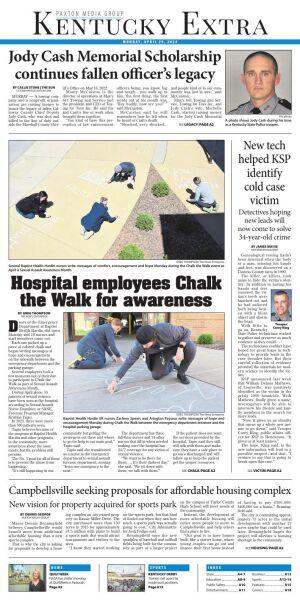The primary objective of any legislative session is passing responsible legislation that will benefit the state for years, if not decades, to come. While this often takes the form of new laws, it can also require changes to the state constitution — something that can only happen with approval from Kentucky’s voters. The current version of the Kentucky state constitution was adopted in 1891. Sitting at a preamble and 20 articles long, voters have approved more than 40 amendments in its 133-year-old tenure. Because of this, as lawmakers we sometimes find ways that we can modernize what the original statesmen had in mind. After all, the state has changed quite a bit since 1891.
Constitutional amendments begin the legislative process much like any other bill or resolution. They are drafted, filed, assigned to committee, and debated and discussed. If they are passed by the legislature, they go directly to the secretary of state since a governor’s approval is not required. They are then placed on a ballot for the next general election and voters are prompted at the polls with the proposed change. If the voters affirm the change, it is implemented; if they do not, the amendment fails.
Amendments are ultimately the purist form of democracy, allowing every voter to have their voice heard and the majority to determine the ultimate course. While the state’s constitution is our guiding document and many of its principles are timeless, it was also written at a time when a trip to the state capital took a day by train and longer by horse. Modern conveniences included the light bulb, and the telephone was yet to establish connection between people and places. Even those who drafted the constitution knew that change was inevitable as the state’s needs changed, they even included a process for amendments in the document.
With 58 days of our 60-day legislative session behind us, lawmakers have already approved two proposals for voters to consider this November. In this update, I would like to inform you on the proposed constitutional amendments that you will see when you vote this fall.
Giving Kentuckians a vote on education funding: After approval by both the House and Senate, HB 2 was delivered to the secretary of state’s office late last month. This measure would allow Kentuckians to vote on a proposed amendment to the state constitution that would clear the way for the legislature to empower parents to make educational choices for their children. As a primary focus of the General Assembly, education is a policy issue on the forefront of our agenda in each and every regular session. As an example, kindergarten through 12th grade education accounts for more than 40% of the state’s budget, and the legislature provided historic levels (even adjusted for inflation) of funding in the current and proposed budgets. However, there is still a great deal to be done if we are to empower families to meet their child’s needs. HB 2 would allow voters to settle the issue and determine if they want the legislature to go beyond what those men who framed the constitution knew at a time when education meant one room classrooms that held all grades and were led by educators who often had less than an eighth-grade education themselves.
Maintaining election security in Kentucky: A keystone of a healthy representative democracy is directly related to the well-being and sanctity of their elections. Our constitution contains no language that directly prohibits non-citizens from casting their vote on election day. To remedy this, SB 143 was passed by both chambers and delivered to the secretary of state to be placed on the ballot in November. If passed by voters, the constitution would clearly express that non-citizen in the Commonwealth do not have the right to vote in our elections.
The legislature may place up to four proposed amendments on each general election ballot, and others have been filed for consideration this session. So, there is still a chance we will see movement on other amendments that have been proposed this year. One, HB 4, would update constitutional limitations on when the legislature can meet, giving lawmakers more flexibility in setting our session schedule by letting us determine the date a regular session can end. As you may know, we now have to adjourn by March 30 in odd-years and April 15 in even years. As we have seen firsthand since the pandemic, that timeline no longer meets the needs of a society that moves 24 hours a day, seven days a week. The bill would also allow the General Assembly to convene itself for a special session for no more than 12 legislative days at a time — bringing us in line with other states across the nation and providing more accountability through checks and balances. This measure would benefit the law-making process as a whole, especially in times of disaster. Instead of waiting for the executive branch to spring into action, HB 4 would grant us the ability to make decisions as they are needed, when they are needed.
As always, I can be reached on my mobile at (502)639-7079 or through the toll-free message line in Frankfort at 1-800-372-7181. You can also contact me via e-mail at James.Tipton@lrc.ky.gov and keep track through the Kentucky legislature’s website at legislature.ky.gov.













